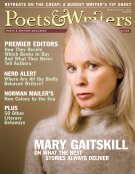He goes on to draw a distinction between creative nonfiction writers and journalists that may have influenced Moore: "Literally or symbolically, we [creative nonfiction writers] can dye our hair green, wear earrings in our navels, and allow our own personalities to appear on the page with our ideas and observations—a seemingly special violation to the journalist, who has been locked into the inverted pyramid 5W format (who-what-when-where-why) over the past half-century and beyond."
Although Gutkind credits journalists such as Gay Talese, Hunter S. Thompson, and Tom Wolfe (the New Journalists, as Wolfe dubbed them in 1973) with using "literary techniques and personal voice" as early as the 1960s in writing for magazines like Esquire, Rolling Stone, and New York and acknowledges "the journalistic, fact-oriented roots of creative nonfiction," he leaves journalists outside the creative nonfiction tent because "journalists have, over the years, been so stifled from being creative that they don't exactly understand what the word creative might signify beyond the parameters of fiction."
One reason Gutkind can make such a claim, of course, is that "creative nonfiction" has strayed far beyond what by any stretch of the term might be called "journalism." Memoir, for instance, which has garnered more attention—and criticism—than other kinds of creative nonfiction, often relies exclusively on an author's memories and imagination. In a note at the opening of his memoir, This Boy's Life (Atlantic Monthly Press, 1989), for example, Tobias Wolff states unabashedly that "this is a book of memory, and memory has its own story to tell." This reliance on dubious recall and the troubling fictionalizing done by memoirists such as James Frey (as well as the my-awful-experience-is-more-shocking-than-yours approach of many memoir writers) has led readers and critics to think of memoir as closer to the novel than to anything truly fact based.
The same can be said of the personal essay, which by nature offers a deeply subjective view of things, no matter how many facts it employs.
With both memoir and personal essay, Gutkind's comments about point of view, personality, and the foregrounding of an author's ideas make sense—as, to a lesser extent, do Moore's about favoring form over content, if that means finding fresh approaches to writing about common human situations. Their appealing ideas about personal freedom run into trouble, however, in creative nonfiction's third category—what Moore, in his generally useful guide to writing creative nonfiction, The Truth of the Matter (Pearson Longman, 2007), calls (without a trace of irony) "literary journalism."
What distinguishes this third category from memoir and personal essay, according to Moore, is only that it "usually focuses outward, on an event, location, or person the author finds worthy of careful examination." He stresses that "literary journalism" must be based on "facts" but offers no advice on how these facts can or should be collected or tested. Or how they might be different from what are taken to be "facts" in a memoir. Instead, he says more than once that all reporting is subjective, as if there were no difference between a memory and the notes taken from direct observation.
In his "Godfather" essay Gutkind stresses, too, that "creative nonfiction writers must always work as hard as necessary to be true to the facts." But while making vague statements about the need to avoid "a loss in substance, integrity, or verifiable facts" when using story to enliven an otherwise journalistic account, he never defines these terms or tells us where the "substance" and "facts" come from. He condemns outright inventions such as making up "saucy dialogue" to improve a story, calling them "inexcusable laziness," but he never suggests how much research, or what kind, a "true" nonfiction account requires.








